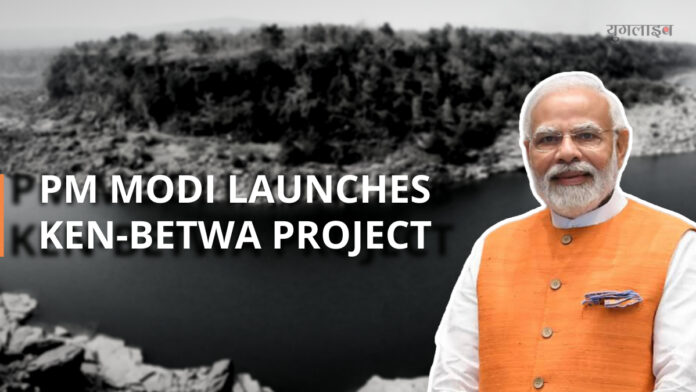Ken-Betwa Link Project: Prime Minister Narendra Modi today inaugurated India’s first major river interlinking project, marking a significant milestone in the country’s water resource management. The ₹44,605-crore Ken-Betwa Link Project (KBLP) aims to address water scarcity in the drought-prone Bundelkhand region.
The project, launched on former Prime Minister Atal Bihari Vajpayee’s birth anniversary, will connect two major tributaries of the Yamuna River – the Ken and the Betwa – through a 221-kilometer canal system.
Ken-Betwa River Link Project
At its core, the KBLP involves creating a complex water transfer system between the Ken and Betwa rivers through a 221-kilometer canal network. The project’s centerpiece, the Daudhan Dam, stretches 2,031 meters in length and rises 77 meters high, incorporating both earthen and concrete construction techniques.
“This project will transform the lives of about 62 lakh people by providing reliable access to drinking water,” said a senior official from the Jal Shakti Ministry. The initiative is expected to irrigate more than 10.62 lakh hectares of agricultural land across Madhya Pradesh and Uttar Pradesh.
The project will generate:
- 103 MW of hydropower
- 27 MW of solar power
- Annual irrigation for 8.11 lakh hectares in MP
- Annual irrigation for 2.51 lakh hectares in UP
Implementation of Ken-Betwa River Link Project
The project will be executed in two phases:
Phase-I focuses on constructing the Daudhan Dam complex, which includes:
- A 2,031-meter-long dam
- High and low-level tunnels
- Main canal infrastructure
Phase-II will develop:
- Lower Orr Dam
- Bina Complex Project
- Kotha Barrage
Benefits and Impact
The project promises several significant benefits:
Water Management
- Irrigation coverage for 10.62 lakh hectares
- Drinking water supply to 62 lakh people
- Generation of 130 MW combined hydroelectric and solar power
Regional Development
- Enhanced agricultural productivity
- Improved water security
- Economic growth in Bundelkhand region
Ken-Betwa project environmental impact
Environmental experts have raised concerns about the project’s impact on the Panna Tiger Reserve. “The submergence of approximately 98 square kilometers of the tiger reserve requires careful consideration,” said an environmental activist associated with wildlife conservation.
The project will require:
- Clearing of about 2-3 million trees
- Relocation of over 6,600 families
- Modification of natural river flows




